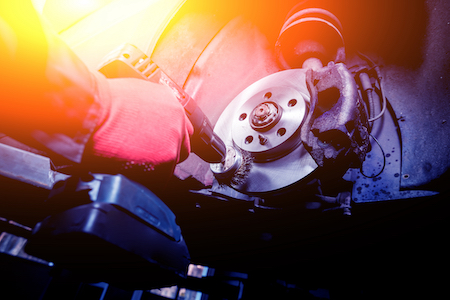What’s the stopping power of your car? How fast can you stop? Of course, that’s a loaded question. The answer is: It depends. It depends on:
- How fast you’re driving
- The maintenance of your vehicle
- How old your brake system is
- What weather conditions are currently
- The make and model of the vehicle
Inherently we know that our cars will stop differently in July than in January. Hot streets create a different experience than a road covered in ice and snow.
And while you might not think about your stopping power every time you jump behind the wheel, you might think about safety. You have a lot going on inside your vehicle. Safety is your number one concern.
This is why brake maintenance should also be top of your list. Brakes keep you safe. Your ultimate goal is to improve stopping power to lower your risk.
What to know about stopping power
What do you need to know about your brakes stopping power? For most drivers, it’s a simple process. Tap on the brakes; the car slows down until it ultimately comes to a stop.
But there’s more to it than that.
Stopping power measures what it takes to bring the vehicle to a stop. It’s the stopping distance as you face everyday driving conditions. Ultimately it depends on:
- How well the brakes work when you tap on the brake pedal
- How well a vehicle reacts when the brake pedal is pressed
- Your perception of driving conditions
- How well you react when you sense a change in driving conditions
In most cases, it takes about three-quarters of a second to perceive a change in driving conditions, and another three-quarters of a second to react and tap the brake pedal to start the braking process. That’s 1.5 seconds before the brakes start doing their job. At a standard 60 mph, your car can travel as much as 120 to 140 feet in that 1.5 seconds.
Once you start the reaction process, it’s the vehicle’s turn takeover. Dry pavement conditions will provide more stopping power than wet pavement. It can easily double or even triple the space needed to bring your vehicle to a complete stop.
All of this is with a car in good working condition. Ignoring regular brake maintenance can increase the time needed to stop, putting you, your passengers, and those around you at risk.
It’s time for brake maintenance
As you continue to drive your car, you’ll get comfortable with how it works. You’ll develop a relationship with it, understanding when it’s trying to communicate with you.
Maybe you hear a strange noise you’ve never heard before. A light flashes on the dashboard. Or an odor becomes apparent when you step on the brakes.
Your vehicle was designed with safety systems to alert you when problems arise. Rarely will systems fail on a dime. Instead, warning signals will be sent, alerting you to potential problems.
If you notice these early, you have time to do something about them. Your brakes are one of the most important systems in your car. Watch for any of these problems. Then take action as soon as possible.
Noisy brakes – Brake pads are the most commonly replaced items within the brake system. The pads are designed with a warning marker to alert you the brake pads are wearing down. You can’t miss this high-pitched squeal. Every time you step on the brake pedal, that squeal will remind you it’s time to replace your brake pads. Ignore it, and the noise will worsen. Wait too long, and it could do more damage to the brake system, possibly warping the rotors. This will increase your repair bill once you bring it in for replacement.
Smelly brakes – It’s not based on sound alone; you’ll notice a smell along with it. As brake pads wear down and possibly impact the brake caliper, it may begin to produce a scent you won’t be able to ignore. It may be a chemical smell as the wear layer burns down, or a burning smell as the brakes heat up. If you notice it, it’s time to bring them in for maintenance.
Soft brakes – You can’t miss this soft, spongy feel when you press down on the brake pedal. You’ll press down further to get the same job done. Moisture can accumulate in the brake fluid reservoir, allowing the brake fluid to boil from the heat generated as you drive. Air in the brake’s hydraulic system can delay the reaction time between pushing on the brake pedal and stopping.
Hard brakes – The opposite is also true. If you push down on the brake pedal and it’s harder than usual, it’s a sign of misaligned brakes or a brake booster no longer functioning correctly.
Tires – The reason you have trouble stopping might not be your brakes at all. Instead, it could be a tire that can no longer function as designed. When tire tread is too thin or too worn, it doesn’t have the traction to bring your vehicle to a stop. It won’t have the “bite” necessary to grip the road. Bad driving conditions only accelerate this problem. That’s why it’s good to have them checked occasionally.
Are your brakes well maintained?
Good brake maintenance starts with getting to know your car. It’s about feeling how it runs when operating well so that you know when something is off.
There’s no denying that one of the most critical systems on your vehicle is your brakes. If they aren’t working correctly, your stopping power can quickly diminish.
When was the last time you had your brakes checked and maintained? If it’s been a while, now may be the time. With quick servicing, our experts will ensure your vehicle is ready to face the challenges of the road ahead, no matter what the Colorado weather throws our way.

